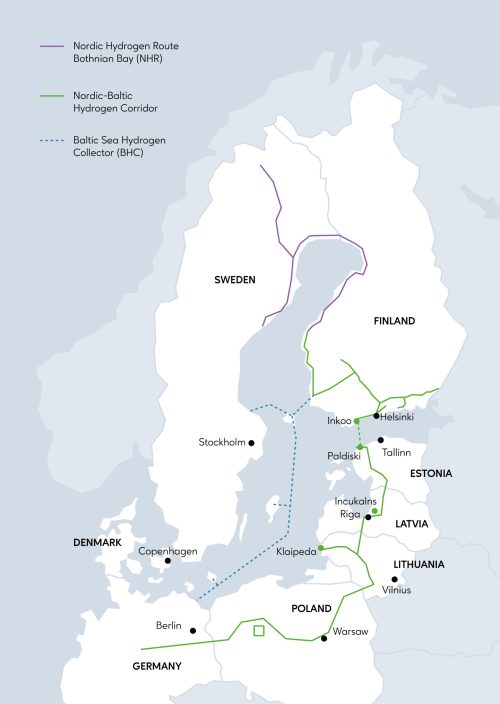Nordic-Baltic Hydrogen Corridor
The goal of the project is to develop hydrogen infrastructure from Finland through Estonia, Latvia, Lithuania and Poland to Germany by 2030. The parties to the project are gas transmission system operators (TSOs): Gasgrid, (Finland), Elering (Estonia), Conexus Baltic Grid (Latvia), Amber Grid (Lithuania), Gaz System (Poland) and ONTRAS (Germany). Gasgrid’s share is particularly related to the development of the hydrogen network covering the whole of Southern Finland and the market in the Baltic Sea region.
The Nordic-Baltic Hydrogen Corridor project supports the diversification of energy supply and the accelerated introduction of renewable energy.
As the hydrogen infrastructure continues to develop around the Baltic Sea, a strong hydrogen market area can also be created, which enables large-scale utilization of abundantly available and competitive renewable energy resources.
The project strongly supports the EU’s hydrogen strategy and the REPowerEU plan. In addition, the hydrogen corridor of the Nordic and Baltic Sea region supports several regional and EU climate goals, such as the EU’s Green Deal program and the Fit for 55 preparedness package.
In the first phase of the project, a preliminary study of the project will be prepared during the first half of the year 2024. Based on the pre-feasibility study recommendations, a decision on continuation of the project development would be made. Following phases in the project would include engineering and permitting phase, construction and commissioning.
Nomination as a Project of Common Interest by the European Commission
On November 28, 202, the European Commission announced that the Nordic-Baltic Hydrogen Corridor (NBHC) is included on its 6th list of European Projects of Common Interest (PCI). The Commission will now submit the PCI list to the European Parliament and the Council for approval. The non-objection period for the co-legislators is expected to be finalized in Q1 2024.
By being part of the PCI-list, the NBHC is deemed as a key cross-border infrastructure project that will contribute to the EU’s energy independence, climate targets and to establishing an affordable, secure and sustainable European energy system. The Parliament and the Council have two months to approve the Commission’s list. If neither of the institutions reject the Commission’s proposal, the PCI list enters into force.
The PCI status will support the NBHC’s realization of a large-scale onshore hydrogen pipeline infrastructure in the Baltic Sea Region by enabling simplified permitting processes and the possibility to apply for funding from the EU’s Connecting Europe Facility program. In the first phase of the project, a preliminary study of the project will be prepared during the year 2023.

Schedule
text
Facts
text



